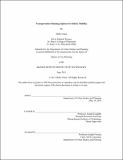Transportation planning options for elderly mobility
Author(s)
Chase, Holly (Holly Elizabeth)
DownloadFull printable version (891.3Kb)
Other Contributors
Massachusetts Institute of Technology. Dept. of Urban Studies and Planning.
Advisor
Joseph Coughlin.
Terms of use
Metadata
Show full item recordAbstract
The population of the United States is aging, yet the current transportation system is not designed to accommodate the elderly. Reduced mobility has a profound impact on elderly well-being, and the transportation needs of older people will only increase as the baby boomer generation ages in the suburbs. Where transportation options do exist, few meet the standards of the private car that the baby boomers have come to expect. I explore the mobility attitudes and habits of the baby boomers and the responses of communities and regions to an already apparent mobility gap. I then evaluate a sample of near-term policy options for decision makers, using case studies of public transportation, SilverRideTM, ITNAmerica®, and villages. I argue that the options vary along the criteria of availability, acceptability, and affordability, and within a taxonomy of fiscal and social capacity. Diverse contexts mean that no one option is sufficient, and communities will ultimately decide which options to pursue based on their unique needs and resources. In the future, policy options will likely evolve to better address public funding constraints and build on informal forms of transportation. Both fiscal and social capacity are necessary for transportation policy options to function optimally over time, and communities can leverage existing social capacity to help enhance elderly well-being and address the unpreparedness of regions and individuals.
Description
Thesis (M.C.P.)--Massachusetts Institute of Technology, Dept. of Urban Studies and Planning, 2011. This electronic version was submitted by the student author. The certified thesis is available in the Institute Archives and Special Collections. Cataloged from student submitted PDF version of thesis. Includes bibliographical references (p. 46-49).
Date issued
2011Department
Massachusetts Institute of Technology. Department of Urban Studies and PlanningPublisher
Massachusetts Institute of Technology
Keywords
Urban Studies and Planning.